Coping with COVID-19
August 12, 2020

BY EMILY CHRISTENSEN | PHOTOS JULIE PAGEL DREWES ’90
On Monday, March 16, 2020, Wartburg College President Darrel Colson took the unprecedented action of ending in-person classes for Winter Term 2020 amidst a coronavirus pandemic that already had sickened nearly 200,000 and killed about 7,800 worldwide.
“It’s no exaggeration to say that we face an unprecedented challenge, but we face it together, and together we will find our way through it,” Colson wrote in a letter to students, faculty, staff, and parents.
The following stories are just a few of the many that could be told from what happened over the subsequent nine weeks as professors hurriedly prepared their courses for remote instruction, students prepared themselves for remote learning, and the remaining campus community prepared itself for a time unlike any other.
Mitigated normalcy
Those were the words Wartburg President Darrel Colson used to describe the plans for the 2020-21 academic year.
“We were getting the same message from both current students and new students. Our current students were eager to return, and our new students indicated a similar eagerness,” Colson said. “This makes sense. Students choose Wartburg because they seek the mentoring community we promise; they want to pursue the rigorous and experiential educational opportunities that we offer; and they desire the rich co-curricular experience that completes the education of their whole person. They yearn for normalcy, even ‘mitigated normalcy.’ No one — not students, not faculty, not staff — wants to continue operating at a distance.”
In mid-June, Colson announced that Fall Term classes would resume on Wednesday, Aug. 26, one week earlier than originally planned. In an effort to minimize travel to and from campus, Fall Break has been eliminated and in-person Fall Term classes will conclude on Nov. 24. Following the Thanksgiving holiday, students will have one week of finals or final activities to complete remotely.
“This revised calendar provides students with the most time in the classroom while limiting the hours spent providing courses remotely,” Colson said. “While in many ways we are still at the mercy of the virus, these changes reflect our intent to keep our students on campus and healthy while providing them the academic and co-curricular experiences that are the hallmark of a Wartburg education.”
In addition to altering the schedule, the college is requiring all students, faculty, staff, and visitors to wear a face covering in public places where physical distancing is not possible. Though students living together on a residence hall floor or in a suite will be considered a “family unit,” students will continually be reminded about the importance of good hand hygiene, covering one’s mouth when coughing or sneezing, and maintaining at least six feet of physical distance whenever possible.
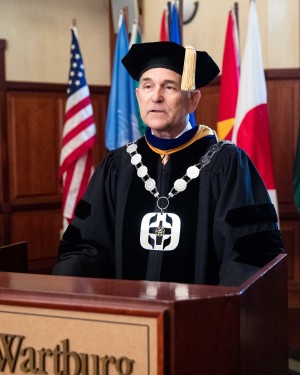
Click here to see the 2020 Virtual Commencement ceremony, read the Class of 2020 Profiles, or read the 20 for ’20 notes of encouragement.
“These guidelines, and our whole Wartburg Cares initiative, is about making a commitment to each other in the Wartburg community,” said Dr. Dan Kittle, vice president for Student Life and chair of the college’s Campus Health Recovery Team. “And, while masks are not a silver bullet, they are one important way we can communicate to each other that we take seriously the health and wellness of our students and colleagues.”
Campus life
When President Colson announced the end of in-person classes on March 16, the Residential Life staff, led by Cassie Hales, was ready to help students move off campus as quickly and safely as possible. They bypassed the usual room inspections and fines, gathered boxes from area retailers, arranged last-minute summer storage options, and worked nearly around the clock to accommodate students and their families who wanted to get home before more strict stay-at-home orders might come.
And when they weren’t helping with moving arrangements, staff were helping students, including many seniors, come to terms with the reality that this was how the year would end.
“We had a lot of sad and scared students, and the Residential Life and Student Life teams stepped up amazingly,” said Hales, director of Residential Life. “Our doors were open and we were there for them. We weren’t always socially distant, but we did what we needed to in that moment.”
When her fellow students began moving off campus in mid-March, Dikgarebe “Vanessa” Mamabolo ’21, from Johannesburg, South Africa, saw very little change in Founders Hall, where she lived with two roommates. The close quarters made the public health major quite anxious as the virus continued to spread in neighboring communities.
“When COVID first started spreading we talked about it in my public health classes, but I never thought it would get this big,” she said this summer through her black mask. . “All I really wanted was my family in South Africa, but I was scared to go home because I wasn’t sure if I would be able to come back.”
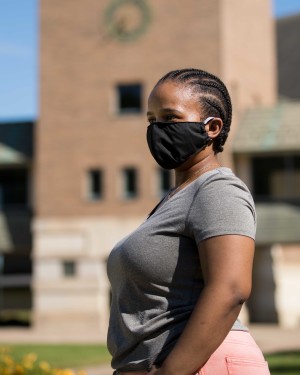
Once the initial flurry of activity was over, the Residential Life team set its sights on helping students on campus and off continue to feel connected to the college and each other despite the physical distance. On campus, staff hosted Music Mondays, taking requests for music that could be enjoyed from a safe distance on Clinton Field. On Wednesdays, The W offered a Zoom fitness class that could be taken by students no matter where they lived. And resident assistants were tasked with reaching out to each and every one of the students who had lived on their floor via email, text, or video conferencing, just to check in.
“This was important to let all of our residents know that we were still here and gauge who was struggling,” Hales said. “I think the biggest thing we learned through all of this is that Wartburg is a residential campus for a reason. We do it really well. I know other schools are looking at going online in the fall, but I really hope we don’t have to do that here because it would completely change who we are. We do a really good job at the residential experience. We can make it work for the short-term, but we just really want our students on campus.”
In addition to the emotional support, Mamabolo also was thankful the Student Life Office was able to stay open so she could retain her job — and her income. For those who weren’t able to keep their on-campus jobs and faced other financial hardships, the Alumni & Parent Relations Office launched the UKnight for Students Fund. On what would have been the college’s sixth annual UKnight Day, alumni and friends instead were asked to donate to the fund, which collected about $48,000 in just a couple days. Those funds, along with other institutional resources, were used to match the nearly $650,000 in federal money Wartburg received from the U.S. Department of Education. The money allowed the college to provide an emergency financial aid grant to every full-time student who was registered during Winter Term.
“Wartburg alumni showed up to support our current students in a big way. Even as they themselves were trying to figure out the new normal, our alumni were quick to understand the needs that our students would be facing during these challenging times. I’m always proud to see our alumni willing to support students they don’t even know, to ensure these students have a positive Wartburg experience,” said Renee Clark Voves ’04, associate director of Institutional Advancement – Alumni & Parent Relations and Annual Giving.
Though Mamabolo was supposed to return home this summer, she opted to remain on campus to ensure she could finish her final year at Wartburg. In addition to her job in Student Life, she found an internship at Cedar Valley Friends of the Family where she works with survivors of sexual assault, human trafficking, and domestic abuse. Now living in her own room in Clinton Hall, she’s feeling better about her health and safety, but worries what will happen come fall, as coronavirus cases begin to spike again across the United States.
“I hope everyone remembers how serious this is and follows the guidelines that are in place,” she said. “In the beginning everyone took social distancing very seriously, but I worry now people are just tired of it.”
At the peak of the COVID-19 pandemic in Iowa, the only thing more consistent in the home of Jared ’04 and Kelly Watkins ’04 Pirkl than the sound of four young boys was the underlying hum of a 3D printer churning out pieces for much-needed personal protective equipment (PPE).
Jared Pirkl, a former Wartburg pitcher and current Knights baseball assistant coach, teaches sixth grade in Cedar Falls, where he was awarded a grant for a 3D printer to use in his classroom. He took it home over spring break to learn the new technology, never realizing that he wouldn’t return to classroom teaching for the remainder of the 2019-20 school year. When Jared’s mother, who has worked in health care since he was a child, started talking about the shortage of PPE in Iowa and around the world, he turned to the internet to see how he might help using the 3D printer.
A friend pointed him to a group of other Cedar Valley volunteers working individually to make the pieces needed to assemble protective visors for health care workers at UnityPoint Health – Allen Hospital.
“When our twins were a year old, we had an experience with RSV (a respiratory illness), and Noah spent nine days at Allen. He was on a ventilator, and we were living at the hospital for that period of time,” Jared said. “We’ve experienced that stress, so this was an easy yes from me.”
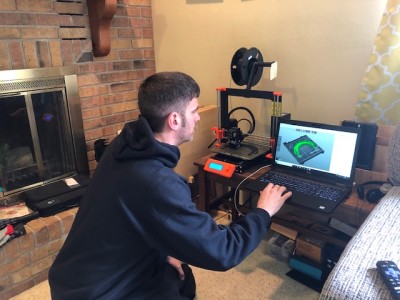
Click here to read about more Knights in Action.
In the days following the World Health Organization’s decision to classify the spread of COVID-19 a pandemic, Wartburg College students and siblings Cameron ’20 and Gabby Corday ’23 approached their professors about how they could help.
The Denver, Iowa, natives’ mother is a physical therapist and their aunt is a nurse in St. Louis, so they heard firsthand about the shortage hospitals either were already facing or were planning for as the number of critically ill patients increased.
“Hearing these stories got me thinking about how PPE (personal protective equipment) was worn within our labs, and now that students are no longer in face-to-face classes, the PPE could be given to others who need it more than Wartburg does at this time,” said Gabby Corday.
Dr. Christine DeVries, associate professor of chemistry, approached her colleagues with the idea, who then took their plans to the dean of faculty. Once getting the go-ahead, the team gathered their unused PPE and when the Waverly Chamber of Commerce posted a list of needs for the Waverly Health Center, DeVries and Eric Berns, the biology lab coordinator, sprang into action.
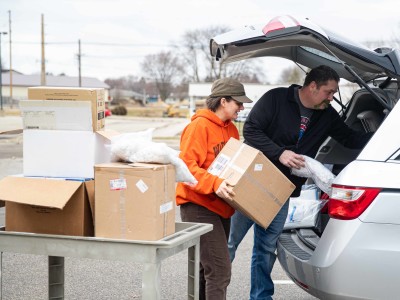
In all, the college donated eight N95 masks, two cases of disposable lab coats, more than 50 boxes of nitrile glove, about 500 disposable sleeves, and one full face shield.
“It would not be in keeping with our mission for workers at our local hospital to be at risk if we have the means to help,” said Dr. Dan Black, chair of the Department of Chemistry, Biochemistry and Engineering. “We were happy to be able to donate the items we were no longer using during this school year.”
Minutes after Iowa Gov. Kim Reynolds announced a statewide shutdown of bars, restaurants, fitness centers, and theatres and banned any gatherings of more than 10 people, Dr. Lee Nelson, Wartburg Choir director, sprung into action.
His students already had planned to gather later in the day for their final class and a hastily planned concert to end the school year. With those plans thwarted, he enlisted the Choir Council, which was meeting at the time of Reynolds’ announcement, to contact as many students as possible to join him in the Wartburg Chapel to sing together one final time before the ban took effect at noon.
“We had one hour before the governor’s ban went into effect. We were going to sing as much as we could,” Nelson said. “It was surreal, but such a blessing considering all things. We were able to have an, albeit last-second, concert. People were still in their pajamas, but no one cared. It is something we will all hang on to.”
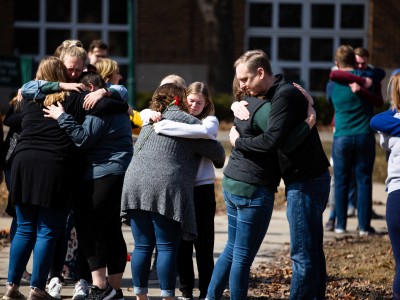
Students continued to join their classmates on the stage throughout the concert, which was livestreamed on Knight Vision and Facebook. Though there were a few moments of levity, many students were visibly shaken, knowing that, for the seniors at least, this would be their last concert.
“I am sad about the way the year ended, but I am grateful for the time I was able to spend with people who had such an impact on my senior year,” said Linzee Espensen ’20, in the moments after the concert.
The choir already had sacrificed greatly amid the coronavirus pandemic, learning on March 12 that their May Term tour through Europe was canceled. Knowing all of this, 2019 graduates Mark Fakler and Emily Meeker, who had stumbled on the concert through Facebook Live, rushed to purchase red carnations for each of the graduating seniors, a choir tradition they couldn’t let fall by the wayside. As the group dispersed around the Chapel for a final, tearful performance of Give Me Jesus, Fakler and Meeker ensured the tradition continued.
“Having this opportunity to get together again was so important for all of us. We have been crying through our last three rehearsals, knowing the end was coming,” said John Krull ’20, who missed the first half of the concert so he could finish his virtual senior recital. “These are all people I will love forever; they fill me with joy. I’m so glad we were able to have this moment.”
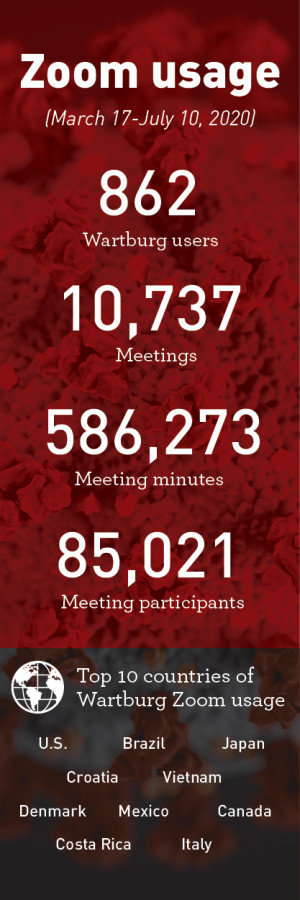
Academics
Dr. Zak Montgomery’s students were some of the first to be impacted by the COVID-19 pandemic. In the days before the college ended in-person instruction, Montgomery, associate professor of Spanish and Harry and Polly Slife Professor in Humanities, was already working with Kathleen Sihler, study away coordinator, to get his students home from Spain safely and then help them complete the requirements needed to receive academic credit for their immersive course.
Nearly simultaneously, Montgomery was devising ways to ensure his on-campus students could accomplish the main goals of their courses when the college transitioned to remote learning.
“I had to think of how I could offer the most flexibility, while still meeting those goals,” he said. “I trimmed some of my readings and shortened or eliminated some material. They could still understand the themes I presented, but we just didn’t get as many voices represented. All of my students really rose to the occasion and bought into making the most of the experience.”
In the Department of Business Administration, Accounting & Economics, most of the professors were already adept at using technology to teach; however, the pivot from in-person to remote learning was a new hurdle.
“We knew what was possible, but it was still a shock,” said Kim Folkers, associate professor of marketing and the Carl and Dorothy Hagemann Endowed Professor in Business and Economics. “In that moment there was a lot of appreciation for our Winter Term schedule because we already had a substantial chunk of the term done and had built relationships with our students, which facilitated better learning when we had to go remote.”
Folkers said the college’s commitment to the transition, which included an institutional licensing account through Zoom, a video communications platform that provided unlimited access to all students, faculty, and staff, was invaluable. Internal support from colleagues who were familiar with the software also helped ease the learning curve, she added.
For Dr. Michael Bechtel ’94, associate professor of science education, Winter Term was never a concern — he already taught Biology 131: Biology of Ordinary Things online during the summers and was able to easily transition in Winter Term. However, figuring out how to teach The Science of Water, a hands-on course that usually takes students across Iowa on day trips, during May Term took weeks of reconfiguring. And, he had to teach twice as many students because several May Term travel courses did not translate into remote work.
“This has always been my second favorite class to teach on campus. We visit Backbone State Park, a sewage treatment plant, the lock and dams. There are just so many things we can do with this class,” Bechtel said.Instead, he found new ways to engage the students with at-home experiences.“It wasn’t the same, but there were parts that were really awesome,” Bechtel said. “And I’ve already created two more labs I could do if the class ever has to be taught remotely again.”
Once the academic side of the house was taken care of, Dr. Penni Pier, professor of journalism and communication and Grant L. Price Endowed Department Chair, shifted her attention to focus on her students’ mental well-being. Her large office in McElroy Center is a natural gathering space for students, and she was determined to keep building those out-of-the-classroom relationships, even though most students were no longer on campus. In addition to daily virtual coffee, Pier also sent handwritten notes and with her daughter, baked meals and treats for the students still on campus.
“For me, it’s all a form of therapy. Spending time with students, writing letters and cards, it all helps me self-soothe and keep my mental health in balance,” she said.
Campus ministry
When students began to disperse, Wartburg’s Spiritual Life & Campus Ministry (SLCM) offerings pivoted quickly to offer online spiritual resources to a campus community that could no longer gather physically.
“Losing our physical worshiping community was painful for all of us, especially the seniors. Fortunately, God’s Spirit cannot be constrained by buildings or even physical proximity,” said the Rev. Brian Beckstrom, dean of spiritual life and Moehlmann Chaplaincy Chair. “I’m amazed at the ways in which God allowed us to minister to one another in such a challenging time.”
Weekday Chapel services were moved online through Knight Vision or Facebook Live, allowing graduating seniors and other speakers to share their messages. Dr. Karen Black, Rudi Inselmann Endowed Professor of Organ, recorded herself playing hymns that were used in the online services. The Wednesday night weekly gathering for Bible study and music, called Sanctuary, continued to meet via Zoom.
In May Term, SLCM usually does not offer weekly Chapel services. But wanting to create a sense of community while being apart, pastoral intern Rebecca Baird ’18 produced a weekly video based on spiritual disciplines, which included a prayer walk with video of campus, meditation, and artistic expression.
Once Commencement shifted to a virtual ceremony, Beckstrom also wanted to offer an online Blessing of the Seniors (Baccalaureate) service. With contributions from Baird, Black, and members of the senior class reading Scripture and leading prayers, the service also featured previously taped selections performed by the Wartburg Choir and Wind Ensemble. The service is available to watch on Knight Vision.
Behind the scenes
While many Wartburg employees were able to transition to remote work in mid-March, staff in some areas weren’t able to take their work home. With about 200 students remaining on campus through May Term, employees were needed on campus to ensure students were well cared for.
In Dining Services, state mandates required the college to eliminate dine-in seating without warning.
“That quick change left us scrambling. We just weren’t set up to do takeout for all our students and their guests,” said Marty Johnson ’83, director of Dining Services.
There were other bumps along the way, as the team determined how best to continue to serve students while limiting their exposure. Student satisfaction went up when meal transfers in The Den, which allowed students additional options, were re-instated.
“It was a crazy couple of weeks. We would make plans in the morning and have to change them by the afternoon,” Johnson said. “We learned a lot of things, but what was re-iterated is why it is so important that things are well thought out and well communicated.”
In cleaning, the rules weren’t changing, but expectations were on the rise. In the early days of the pandemic, Keith Strand, director of general maintenance and cleaning, redirected student workers to make additional cleaning and disinfecting passes through high-traffic areas, like elevator buttons, door knobs, and hand railings.
“We went through a lot of disposable gloves and disinfectant during that time,” Strand said.
As the situation began to stabilize on campus, Strand worked with Residential Life to determine which halls were empty and with the Academic Affairs Office to find out which classrooms and labs could be thoroughly disinfected and closed so the cleaning staff could focus their attention on locations that were still in use.
“It’s been hard on my staff, but they are working hard and want to be here so they can help keep the campus open,” Strand said.
